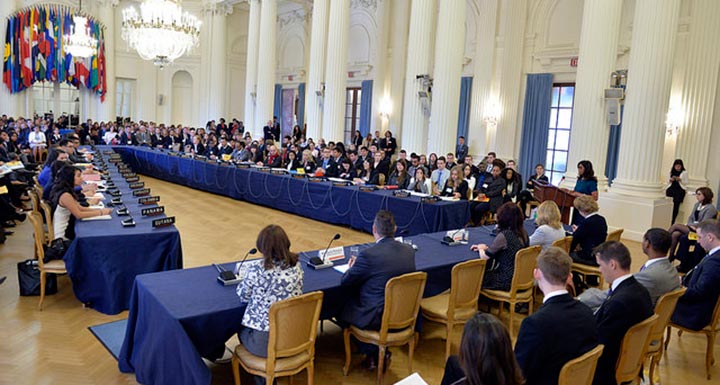
The OAS and Cuba-U.S. negotiations
The White House is desperately trying to preserve the OAS as its primary organization for managing Western Hemisphere Affairs. After all, the Organization of American States is based in Washington and it used to work for the White House. Although it nominally includes all 35 nations of the Western Hemisphere, the Kennedy administration, gearing up forOperation Mongoose, engineered Cuba’s suspension in 1962. After that, the U.S. president never had to meet the Cuban prime minister or president face-to-face at the OAS Summit.
But in 2009 a major change took place: the OAS voted to end Cuba’s suspension. President Obama made it clear he would not attend the next Summit, in 2012, if the president of Cuba attended.
Meanwhile, Latin American and the Caribbean States were creating a different model for the hemisphere – the Community of Latin American and Caribbean States. CELAC was formally established in 2011 in Venezuela, with the initiative of the late Venezuelan President Hugo Chávez. CELAC includes all 33 countries of Latin America and the Caribbean, including Cuba, and excludes the United States and Canada.
At the 2012 OAS Summit, the Final Declaration demanded an end to the U.S. trade embargo against Cuba and an end to Cuba’s expulsion. The United States and Canada vetoed. So that OAS Summit ended without a Final Declaration. When several countries planned to boycott the 2015 Summit if Cuba were not present, President Obama had two choices. He could refuse to attend and therefore be totally isolated or he could join in welcoming Cuba back into the OAS and be a statesman!
His decision to try being a statesman contributed to the secret negotiations between the United States and Cuba that began almost two years ago and led to the announcements of last December 17, which included a plan to re-establish relations between the two countries and to release on that very day the three members of the Cuban Five still in U.S. prisons along with the release of Alan Gross, the State Department secret operative who was imprisoned in Cuba. In addition, Cuba would release some other people in prison for spying.
President Obama wanted these announcements to lead to setting up embassies in Havana and Washington before the OAS Summit in April, setting the stage for him to act as a statesman. But there are obviously major obstacles to the establishment of diplomatic relations when the United States continues its trade embargo against Cuba, keeps Cuba on its list of state sponsors of terrorism, and occupies Cuban territory at Guantánamo. Yet some progress seemed to be taking place in the first two negotiating sessions.
But Washington is Washington. Imperialism is imperialism. And on March 9, a week before a third round of negotiations, President Obama declared that Venezuela is an extraordinary threat to national security. This boomerang returned to its source more rapidly than usual. The whole world could plainly see that it is the United States that threatens the national security of Venezuela, rather than Venezuela threatening the national security of the United States. Perhaps the White House assumed that improved relations with Cuba would muffle reaction to the threat against Venezuela.
To the contrary, President Raúl Castro flew to Venezuela to join ALBA leaders in support of Venezuelan President Nicolás Maduro. The Bolivarian Alliance for the Peoples of Our America is another 21st-century organization that aims for cooperation among Latin American and Caribbean nations, using barters and mutual economic aid. For example, Venezuela provides oil to some countries at subsidized prices. President Obama knows full well how overthrowing the current Venezuelan government would adversely affect those nations.
The New York Times knows this, too, which is why it prefers not to mention the word ALBA. The Times reported that President Castro arrived in Venezuela “for a meeting of left-leaning nations” — not even naming ALBA, much less describing what ALBA signifies.
Meanwhile the third round of negotiations ended quickly after only one day – the day before President Castro flew to Venezuela. In his speech at the ALBA Summit in Caracas, President Castro said, “The United States should understand once and for all that it is impossible to seduce or buy Cuba.”
The OAS Summit meeting in April in Panama will be interesting.
Jane Franklin is the author of Cuba and the United States: A Chronological History. Some of her work is available at http://www.janefranklin.info

